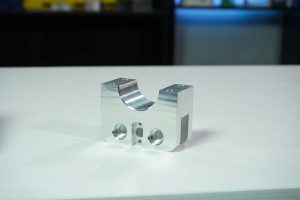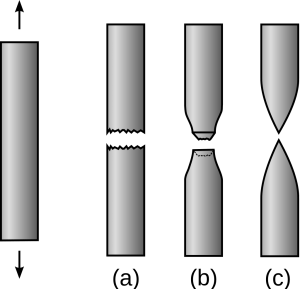Introduction to Delrin
Delrin, also known as Polyoxymethylene (POM), is a thermoplastic polymer widely recognized for its high strength, stiffness, and dimensional stability. Its chemical makeup consists of repeating units of an -O-CH2– backbone which provides the resilience necessary for demanding engineering applications. In the realm of CNC machining technology, Delrin’s low friction and wear resistance make it an invaluable material, especially for parts that require precision such as gears, bearings, or insulating components. The ease with which it can be machined to tight tolerances, along with its consistency in various environmental conditions, underscores Delrin’s critical role, assuring engineers of its reliable performance in mechanically stressed roles.
Properties of Delrin Relevant to CNC Machining
Delrin, a polyoxymethylene (POM) thermoplastic, is favored in CNC machining for its high tensile strength, stiffness, and dimensional stability. Renowned for its low friction and excellent wear resistance, it operates well under mechanical stress and consistent movement – making it an ideal choice for gears, bearings, and other moving components. When compared with materials such as nylon or ABS, Delrin stands out due to its superior fatigue endurance and moisture resistance, which helps maintain precision in complex parts without warping. Furthermore, its natural lubricity surpasses other plastics, reducing the need for additional lubrication in machinery elements.
Advantages of Using Delrin in CNC Machining
Delrin stands out as a preferred material in CNC machining due to its excellent machinability, allowing for precision cutting and shaping without compromising the integrity of the end product. The durability and resistance to wear contribute to longer-lasting components, which is especially beneficial in mechanical applications where repeated friction is an issue. Notably, Delrin possesses a low friction coefficient and demonstrates commendable impact resistance, reducing the need for frequent replacements and maintenance. Moreover, this thermoplastic’s low moisture absorption rate ensures dimensional stability across various environmental conditions, making it an ideal choice for parts exposed to humidity or submerged operations. In summary, Delrin’s combination of machinability, longevity, and consistency under diverse conditions makes it a versatile and reliable option for intricate CNC machining tasks.
Applications of Delrin in CNC Machined Parts
In the realm of CNC machining technology, Delrin is highly prized for its mechanical properties and ease of fabrication, which has led to its widespread use across multiple industries. Notably, the automotive sector takes advantage of Delrin’s low friction and wear resistance for creating bushings, gears, and safety restraint components. Similarly, within the electronics industry, it serves as an excellent material for insulating parts like connectors and different structural housings due to its electrical insulation capabilities. Medical device manufacturers lean on Delrin for constructing durable, sterilizable components such as surgical tool handles, which benefit from both the material strength and compliance with rigorous sanitation standards. Each Delrin component, carefully crafted through precision CNC machining, plays a vital role – whether ensuring the smooth operation of machinery or maintaining the reliability of life-saving medical equipment.
Challenges in Machining Delrin
Machining Delrin, a popular acetal homopolymer plastic known for its high strength and rigidity, presents several unique challenges. One common issue is the material’s tendency to deform or melt due to heat generated during the CNC machining process. This can result in poor surface finishes or inaccuracies in dimensions. To mitigate these difficulties, machinists should employ sharp, appropriate tooling and optimize cutting speeds and feeds to minimize heat buildup. Additionally, utilizing coolants can aid in dissipating heat and reducing friction. Another challenge with Delrin comes from its inherent resilience and lack of chip formation, which sometimes leads to gumming up of the cutting tool. Overcoming this requires using specialized chip breakers or geometry on the cutting tools designed specifically for plastics. By adhering to these strategies, manufacturers can proficiently handle the nuances of machining Delrin, maintaining part quality and extending tool life.
Tips for Efficient CNC Machining of Delrin
For efficient CNC machining of Delrin, selecting the appropriate tools and optimizing machine settings are crucial. Utilizing sharp carbide or polycrystalline diamond (PCD) cutting tools can prevent material buildup on the tool’s edge and ensure a smoother finish. The use of single-flute end mills enables effective chip evacuation, reducing the chance of re-cutting chips which can impair the surface quality and dimensional accuracy. Optimal feed rates and spindle speeds vary with part design and complexity; however, a general recommendation is to maintain high spindle speeds while adjusting feed rates to minimize heat generation without sacrificing efficiency. Cooling aids such as non-aromatic, water-soluble coolants can be applied to help with heat dissipation and reduce potential warping of the workpiece.
Economic Considerations of Using Delrin in CNC Machining
When analyzing the cost-effectiveness of using Delrin in comparison to metals or other plastics for CNC machining, it’s imperative to consider not only the upfront material and processing costs but also long-term lifecycle expenses. Delrin, being a thermoplastic polymer, often showcases superior machinability which translates into reduced labor time and lower energy consumption during manufacturing. This efficiency can result in noticeable cost savings especially when large volumes are produced. Furthermore, Delrin’s durability plays a crucial role in its economic advantage over less robust materials. Its resistance to wear, low friction coefficients, and minimal moisture absorption contribute towards less frequent need for replacement parts, lowering total lifecycle costs associated with maintenance and downtime. These attributes make Delrin a highly appealing option for applications where longevity and performance are critical financial factors.
Environmental Impact and Safety of Manufacturing with Delrin
The environmental aspects of manufacturing with Delrin, a thermoplastic commonly used in CNC machining, require careful consideration during its lifecycle. The material is resistant to many environmental factors, which adds to its longevity but also poses challenges for recycling and disposal due to its persistence. Dealing with offcuts and waste from the machining process must align with ecological guidelines to minimize the impact on the environment. Regarding health and safety, proper ventilation is crucial since machining Delrin can release formaldehyde gas, which is an irritant and potential carcinogen. Workers should employ personal protective equipment such as eye protection and masks, and follow established handling protocols to ensure safe operations. Facilities are advised to have systems that capture and neutralize fumes and to educate their staff about proper procedures for both normal conditions and accidental exposure scenarios.
Design Considerations with Delrin in CNC Machining
When designing parts to be machined from Delrin, a few key considerations must be kept in mind to ensure optimal performance and manufacturability. Firstly, the material’s tendency for low friction should be factored into design tolerances since it allows for more freely moving mating components. Additionally, due to its high strength and stiffness, proper support during machining is necessary to reduce warping or deformation. It’s also important to accommodate for Delrin’s thermal expansion which could impact tight-fitting assemblies at different temperature ranges.
Delrin in High-Temperature Applications
Although Delrin possesses many desirable properties, it may not be the best candidate for high-temperature applications. Its maximum operating temperature is typically around 80° – 120°C (176° – 248°F), above which its mechanical properties can degrade significantly. For situations requiring sustained exposure to high temperatures, materials with higher heat resistance should be considered to maintain structural integrity and function.
Aging Effects on Delrin Properties
Over time, Delrin can experience changes in properties due to aging, which designers should account for depending on the intended application. Environmental factors like prolonged UV exposure and chemical contact can lead to oxidation and discoloration, potentially reducing impact strength. Proper assessment of the operational environment is crucial to predict long-term performance and durability of Delrin parts.
Suitability of Delrin for Medical Devices
Delrin is often selected for use in medical devices because of its biocompatibility, ease of sterilization, and overall durability. However, it is essential that the grade of Delrin used complies with FDA regulations specific to medical applications. Designers should verify that the specific type of Delrin chosen meets all requirements for direct or indirect contact with human tissue or bodily fluids before incorporating it into a medical device.



